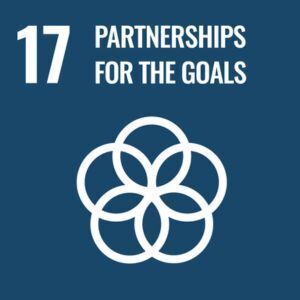Photo by Greg Dunn and Will Drinker
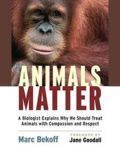
Bekoff, Marc. Animals Matter: A Biologist Explains Why We Should Treat Animals with Compassion and Respect (Shambala, 2007)
Nonhuman animals have many of the same feelings we do. They get hurt, they suffer, they are happy, and they take care of each other. Marc Bekoff, a renowned biologist specializing in animal minds and emotions, guides readers from high school age up—including older adults who want a basic introduction to the topic—in looking at scientific research, philosophical ideas, and humane values that argue for the ethical and compassionate treatment of animals. Citing the latest scientific studies and tackling controversies with conviction, he zeroes in on the important questions, inviting reader participation with “thought experiments” and ideas for action. Among the questions considered:
- Are some species more valuable or more important than others?
- Do some animals feel pain and suffering and not others?
- Do animals feel emotions?
- Should endangered animals be reintroduced to places where they originally lived?
- Should animals be kept in captivity?
- Are there alternatives to using animals for food, clothing, cosmetic testing, and dissection in the science classroom?
- What can we learn by imagining what it feels like to be a dog or a cat or a mouse or an ant?
- What can we do to make a difference in animals’ quality of life?
Bekoff urges us not only to understand and protect animals—especially those whose help we want for our research and other human needs—but to love and respect them as our fellow beings on this planet that we all want to share in peace.
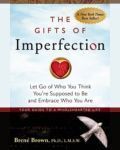
Brown, Brene. The Gifts of Imperfection: Your Guide to a Wholehearted Life (Hazelden Publishing, 2010)
Brené Brown is no ordinary sociologist. She calls herself, quite accurately, a “researcher-storyteller” and her seminal research on vulnerability, shame and empathy has brought about a whole new understanding of an intricate dimension of human authenticity and worth: Something she calls “wholeheartedness.” Her most recent book, The Gifts of Imperfection: Let Go of Who You Think You’re Supposed to Be and Embrace Who You Are, isn’t the self-help bible the title may mislead you to expect. Rather, it’s a treasure trove of insight on emotional health and psychological balance, rooted in a decade’s worth of rigorous research but delivered in a deeply human way. It’s so fantastic, in fact, that when we first featured it late last year, it quickly became one of the most-read, most-shared Brain Pickings articles in all of 2010.
The Gifts of Imperfection examines one of the greatest foundations of happiness — our sense of and need for belonging, both with others and in our own skin — and brings to it a level of authenticity and understanding that fundamentally changes the way we relate to ourselves and each other.
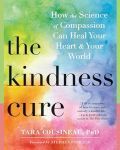
Cousineau, Tara. The Kindness Cure: How the Science of Compassion Can Heal Your Heart and Your World (New Harbinger Publications, 2018)
It’s time for a kindness revolution. In The Kindness Cure, psychologist Tara Cousineau draws on cutting-edge research in psychology and neuroscience to show how simple practices of kindness—for ourselves, for others, and for our world—can dissolve our feelings of fear and indifference, and open us up to a life of profound happiness.
Compassion for ourselves and others is our birthright as humans—hardwired into our DNA and essential to our happiness. But in our fast-paced, technical savvy and hyper competitive world, it may come as no surprise that rates of narcissism have risen, while empathy levels have declined. We now find ourselves in a “cool to be cruel” culture where it’s easy to feel disillusioned and dejected in our hearts, homes, and communities. So, how can we reverse this malady of meanness and make kindness and compassion an imperative?
The Kindness Cure draws on the latest social and scientific research to reveal how the seemingly “soft skills” of kindness, cooperation, and generosity are fundamental to our survival as a species. In fact, it’s our prosocial abilities that put us at the head of the line. Blended with moving case studies and clinical anecdotes, Cousineau offers practical ways to rekindle kindness from the inside out.
We are wired to care. The very existence of our human species evolved because of an intricate physiology built for empathy, compassion, and cooperation. Yet we have an epidemic of loneliness, indifference, and cruelty, and we see these destructive trends on a daily basis in our families, schools, neighborhoods, and workplaces. This important book teaches effective skills in compassion, mindfulness, and social and emotional learning, and reveals successful social policy initiatives in empathy taking place that inform everything from family life to education to the workplace.
Kindness has the exponential power to renew relationships and transform how we think, feel, and behave in the world. Will you be a part of the revolution?
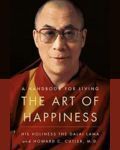
Cutler, Howard and His Holiness The Dalai Lama. The Art of Happiness: A Handbook for Living
Science may be a reliable source of illumination, but it would be short-sighted to let it completely eclipse centuries of spiritual tradition investigating the underbelly of human nature. There is hardly a cultural figure more revered in that realm than His Holiness the Dalai Lama.
The Art of Happiness, a landmark articulation of the philosophy of peace and compassion as a foundation of happiness by Gyatso, His Holiness the Fourteenth Dalai Lama, has served as a powerful guide to well-being for secular and spiritual happiness seekers alike for the past twelve years.
If you want others to be happy, practice compassion. If you want to be happy, practice compassion.
~ His Holiness the Fourteenth Dalai Lama
Both timeless and timely in today’s cultural landscape of ubiquitous moral, political and environmental turmoil, where it’s all the more important to develop the skills for finding inner peace amid chaos, The Art of Happiness captures with eloquent simplicity the most important point of all: Happiness, like any art, requires diligent study and disciplined practice.
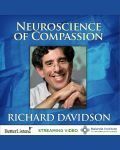
Davison, Richard J. Neuroscience of Compassion (BetterListen, 2017)
“The best way to activate positive-emotion circuits in the brain is through generosity,” Davidson, who founded the Center for Investigating Healthy Minds at University of Wisconsin, Madison, said in a talk at the Aspen Ideas Festival. “This is really a kind of exciting neuroscientific finding because there are pearls of wisdom in the contemplative tradition—the Dalai Lama frequently talks about this—that the best way for us to be happy is to be generous to others. And in fact the scientific evidence is in many ways bearing this out, and showing that there are systematic changes in the brain that are associated with acts of generosity.”
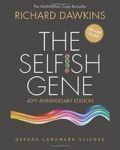
Dawkins, Richard. The Selfish Gene (Oxford University Press; 2nd edition, 1990)
Richard Dawkins' brilliant reformulation of the theory of natural selection has the rare distinction of having provoked as much excitement and interest outside the scientific community as within it. His theories have helped change the whole nature of the study of social biology, and have forced thousands of readers to rethink their beliefs about life.
In his internationally bestselling, now classic volume, The Selfish Gene, Dawkins explains how the selfish gene can also be a subtle gene. The world of the selfish gene revolves around savage competition, ruthless exploitation, and deceit, and yet, Dawkins argues, acts of apparent altruism do exist in nature. Bees, for example, will commit suicide when they sting to protect the hive, and birds will risk their lives to warn the flock of an approaching hawk.
This revised edition of Dawkins' fascinating book contains two new chapters. One, entitled "Nice Guys Finish First," demonstrates how cooperation can evolve even in a basically selfish world. The other new chapter, entitled "The Long Reach of the Gene," which reflects the arguments presented in Dawkins' The Extended Phenotype, clarifies the startling view that genes may reach outside the bodies in which they dwell and manipulate other individuals and even the world at large. Containing a wealth of remarkable new insights into the biological world, the second edition once again drives home the fact that truth is stranger than fiction.
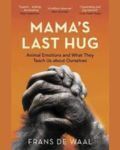
de Waal, Frans. Mama's Last Hug: Animal Emotions and What They Tell Us about Ourselves (W.W. Norton, 2019)
Frans de Waal has spent four decades at the forefront of animal research. Following up on the best-selling Are We Smart Enough to Know How Smart Animals Are?, which investigated animal intelligence, Mama’s Last Hug delivers a fascinating exploration of the rich emotional lives of animals.
Mama’s Last Hug begins with the death of Mama, a chimpanzee matriarch who formed a deep bond with biologist Jan van Hooff. When Mama was dying, van Hooff took the unusual step of visiting her in her night cage for a last hug. Their goodbyes were filmed and went viral. Millions of people were deeply moved by the way Mama embraced the professor, welcoming him with a big smile while reassuring him by patting his neck, in a gesture often considered typically human but that is in fact common to all primates. This story and others like it form the core of de Waal’s argument, showing that humans are not the only species with the capacity for love, hate, fear, shame, guilt, joy, disgust, and empathy.
De Waal discusses facial expressions, the emotions behind human politics, the illusion of free will, animal sentience, and, of course, Mama’s life and death. The message is one of continuity between us and other species, such as the radical proposal that emotions are like organs: we don’t have a single organ that other animals don’t have, and the same is true for our emotions. Mama’s Last Hug opens our hearts and minds to the many ways in which humans and other animals are connected, transforming how we view the living world around us.
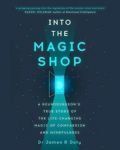
Doty, James. Into the Magic Shop (Avery Publishing, 2017)
The award-winning New York Times bestseller about the extraordinary things that can happen when we harness the power of both the brain and the heart.
Growing up in the high desert of California, Jim Doty was poor, with an alcoholic father and a mother chronically depressed and paralyzed by a stroke. Today he is the director of the Center for Compassion and Altruism Research and Education (CCARE) at Stanford University, of which the Dalai Lama is a founding benefactor. But back then his life was at a dead end until at twelve he wandered into a magic shop looking for a plastic thumb. Instead he met Ruth, a woman who taught him a series of exercises to ease his own suffering and manifest his greatest desires. Her final mandate was that he keep his heart open and teach these techniques to others. She gave him his first glimpse of the unique relationship between the brain and the heart.
Doty would go on to put Ruth’s practices to work with extraordinary results—power and wealth that he could only imagine as a twelve-year-old, riding his orange Sting-Ray bike. But he neglects Ruth’s most important lesson, to keep his heart open, with disastrous results—until he has the opportunity to make a spectacular charitable contribution that will virtually ruin him. Part memoir, part science, part inspiration, and part practical instruction, Into the Magic Shop shows us how we can fundamentally change our lives by first changing our brains and our hearts.
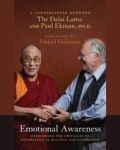
Ekman, Paul and HH Dalai Lama. Emotional Awareness: Overcoming the Obstacles to Emotional Balance and Compassion (Macmillan Audio, 2008)
Two leading thinkers engage in a landmark conversation about human emotions and the pursuit of psychological fulfillment. At their first meeting, a remarkable bond was sparked between His Holiness the Dalai Lama, one of the world's most revered spiritual leaders, and the psychologist Paul Ekman, whose groundbreaking work helped to define the science of emotions. Now these two luminaries share their thinking about science and spirituality, the bonds between East and West, and the nature and quality of our emotional lives.
In this unparalleled series of conversations, the Dalai Lama and Ekman prod and push toward answers to the central questions of emotional experience. What are the sources of hate and compassion? Should a person extend her compassion to a torturer - and would that even be biologically possible? What does science reveal about the benefits of Buddhist meditation, and can Buddhism improve through engagement with the scientific method? As they come to grips with these issues, they invite us to join them in an unfiltered view of two great traditions and two great minds.
Accompanied by commentaries on the findings of emotion research and the teachings of Buddhism, their interplay - amusing, challenging, eye-opening, and moving - guides us on a transformative journey in the understanding of emotions.
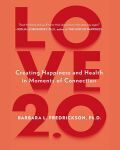
Fredrickson, Barbara. Love 2.0: Finding Happiness and Health in Moments of Connection (Plume, 2013)
In this groundbreaking relationship book, positive emotions expert Barbara L. Fredrickson gives us an entirely new way of understanding love and appreciating its benefits.
A radically new conception of love.
~ The Atlantic
Even more than happiness and optimism, love holds the key to improving our mental and physical health as well as lengthening our lives. Using research from her own lab, Barbara L. Fredrickson redefines love not as a stable behemoth, but as micro-moments of connection between people—even strangers. She demonstrates that our capacity for experiencing love can be measured and strengthened in ways that improve our health and longevity. Finally, she introduces us to informal and formal practices to unlock love in our lives, generate compassion, and even self-soothe.
Rare in its scope and ambitious in its message, Love 2.0 will reinvent how you look at and experience our most powerful emotion.
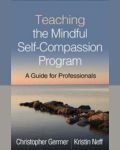
Germer, Christopher and Kristin Neff. Teaching the Mindful Self-Compassion Program: A Guide for Professionals (The Guilford Press, 2019)
This is the authoritative guide to conducting the Mindful Self-Compassion (MSC) program, which provides powerful tools for coping with life challenges and enhancing emotional well-being. MSC co-developers Christopher Germer and Kristin Neff review relevant theory and research and describe the program's unique pedagogy. Readers are taken step by step through facilitating each of the eight sessions and the accompanying full-day retreat.
Detailed vignettes illustrate not only how to teach the course's didactic and experiential content, but also how to engage with participants, manage group processes, and overcome common obstacles. The final section of the book describes how to integrate self-compassion into psychotherapy. Purchasers get access to a companion website with downloadable audio recordings of the guided meditations.
Note: This book is not intended to replace formal training for teaching the MSC program.
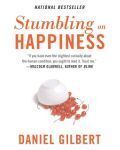
Gilbert, Daniel. Stumbling On Happiness (Vintage, 2007)
Nearly four years ago, Harvard psychologist Daniel Gilbert published Stumbling On Happiness. To this day, it remains the best-researched yet captivatingly digestible book on the art and science of happiness, exposing with equal parts wit and scientific rigor the many misconceptions we have about happiness, the tricks our minds play on us in its pursuit and how the limitations of our imagination get in the way of the grand quest.
Sample the book’s nuggets of wisdom with Gilbert’s excellent TED talk from 2008:
We have within us the capacity to manufacture the very quality we are constantly chasing.
~ Daniel Gilbert
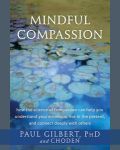
Gilbert, Paul and Choden. Mindful Compassion: How the Science of Compassion Can Help You Understand Your Emotions, Live in the Present, and Connect Deeply with Others (New Harbinger Publications, 2014)
Are you ready to transform your mind and emotions? To cultivate compassion, stability, self-confidence, and well-being? If so, get ready to change the way you experience your life with this highly-anticipated approach using mindfulness and compassion.
Therapists have long been aware of mindfulness as a powerful attention skill that can help us live with greater clarity and awareness―but mindfulness alone is not enough to completely change the way a brain works. In order to fully thrive, we require motivation. Compassion, like anger or aggression, is an extremely powerful motivational force that can bring about real, lasting change.
Written by the founder of compassion-focused therapy (CFT), Paul Gilbert and former Buddhist monk, Choden, Mindful Compassion is a unique blending of evolutionary and Buddhist psychology. In this breakthrough book, you’ll learn how traditional mindfulness and compassion can work in harmony to offer a new, effective, and practical approach to overcoming everyday emotional and psychological problems.
If you are ready to end toxic self-criticism, heal trauma and shame, feel worthy and loveable, and be kinder to yourself and others, this book can show you the way.
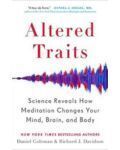
Goleman, Daniel and Richard J. Davidson. Altered Traits: Science Reveals How Meditation Changes Your Mind, Brain and Body (Avery, 2018)
In the last twenty years, meditation and mindfulness have gone from being kind of cool to becoming an omnipresent Band-Aid for fixing everything from your weight to your relationship to your achievement level. Unveiling here the kind of cutting-edge research that has made them giants in their fields, Daniel Goleman and Richard Davidson show us the truth about what meditation can really do for us, as well as exactly how to get the most out of it.
Sweeping away common misconceptions and neuromythology to open readers’ eyes to the ways data has been distorted to sell mind-training methods, the authors demonstrate that beyond the pleasant states mental exercises can produce, the real payoffs are the lasting personality traits that can result. But short daily doses will not get us to the highest level of lasting positive change—even if we continue for years—without specific additions. More than sheer hours, we need smart practice, including crucial ingredients such as targeted feedback from a master teacher and a more spacious, less attached view of the self, all of which are missing in widespread versions of mind training.
The authors also reveal the latest data from Davidson’s own lab that point to a new methodology for developing a broader array of mind-training methods with larger implications for how we can derive the greatest benefits from the practice. Exciting, compelling, and grounded in new research, this is one of those rare books that has the power to change us at the deepest level.
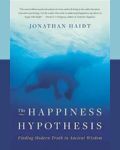
Haidt, Jonathan. The Happiness Hypothesis: Finding Modern Truth in Ancient Wisdom (Hachette Audio, 2018)
The question of what makes us happy is likely as old as human cognition itself and has occupied the minds of philosophers, prophets and scientists for millennia. In The Happiness Hypothesis: Finding Modern Truth in Ancient Wisdom, psychology professor Jonathan Haidt unearths ten great theories of happiness discovered by the thinkers of the past, from Plato to Jesus to Buddha, to reveal a surprising abundance of common tangents. (For example, from Shakespeare: “There is nothing either good or bad, but thinking makes it so.” From Buddha: “Our life is the creation of our mind.”)
Human rationality depends critically on sophisticated emotionality. It is only because our emotional brains work so well that our reasoning can work at all.
Haidt takes this ambitious analysis of philosophical thought over the centuries and examines it through the prism of modern psychology research to extract a remarkably compelling blueprint for optimizing the human condition for happiness.
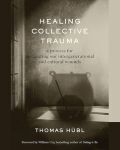
Hubl, Thomas. Healing Collective Trauma: A Comprehensive Guide to Understanding and Healing Shared Trauma (Sounds True, 2020)
What can you do when you carry scars not on your body, but within your soul? And what happens when those spiritual wounds exist not just in you, but in everyone in your family, community, and even beyond?
Spiritual teacher Thomas Hübl has spent years investigating why it is that old and seemingly disconnected traumas can seed their way through communities and across generations. His work culminates in Healing Collective Trauma, a new perspective on trauma that addresses both its visible effects and its most hidden roots. Thomas combines deep knowledge of mystical traditions with the latest scientific research. “In this way,” writes Thomas, “we are weaving a double helix between ancient wisdom and contemporary understanding.”
Thomas details the Collective Trauma Integration Process, a group-based modality for evoking and eventually dissolving stuck traumatic energies. Providing structured practices for both students and group facilitators, Healing Collective Trauma is intended to build a practical tool kit for integration.
Here, you will learn:
- The innumerable ways trauma shapes our world―from identity and health to economy, geopolitics, and the state of the environment
- The concept of “trauma loyalty”―unconscious group bonds based in a pain narrative
- How the climate crisis is both a manifestation of humanity’s collective trauma and an opportunity to heal
- “Retrocausality”―how the power of presence can reshape the past and make new futures possible
Including essays contributed by experts such as Dr. Gabor Maté, Dr. Otto Scharmer, Dr. Christina Bethell, and Ken Wilber, Healing Collective Trauma offers not just an advanced look at community trauma but also a hopeful glimpse of the future. As Thomas declares, “Together, I believe we can and must heal the ‘soul wound’ that marks us all. In so doing, we will awaken to the luminous possibility and profound potential of our true, mutual nature as humankind.”
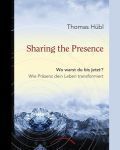
Hubl, Thomas. Sharing the Presence (Kamphausen Media GmbH, 2009)
Sharing the Presence e.V. is a non-profit organization founded in 2010, dedicated to conscious cultural change through raising awareness of the importance of mature participation in society. We facilitate intercultural communication and growth through small and large group events, conferences, festivals and other projects. Our work supports a sense of belonging to healthy social environments and a sense of becoming – through the opportunity to develop in life, in both individual and cultural terms.
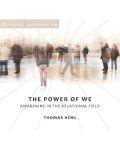
Hubl, Thomas. The Power of We: Awakening in the Relational Field (Sounds True, 2014)
Six Sessions of Teachings for Integrating Spirituality into Work, Love, and Life
How does spiritual awakening take root in our lives? Does it happen on the meditation cushion, in the yoga studio, or on long retreats? “Our inner work plants the seeds of insight,” teaches Thomas Hübl, “yet lasting transformation emerges as we take our practice into the world of love, work, and culture―what I call the relational field.” On The Power of We, he presents a compelling vision of what fully engaged spiritual practice can be, with in-depth guidance into the fundamental competencies you’ll need to sustain awakening in the fast-placed “marketplace” of our modern world.
Tools and Insights for Awakening in the Relational Field
The relational field is more than the sum of our interactions with our friends, family, and intimate partners. As Thomas explains, we exist in relationship to every aspect of life―to our social environment, the past and the future, the wisdom of our chosen spiritual path, and our own potential. In this six-session course, you’ll develop a greater awareness for each relationship that shapes your life―and how to kindle your own evolution through practices such as transparent communication, attuning to subtle energy, illuminating shadow material, and much more.
“For awakening to flourish, it must become our first priority,” says Thomas Hübl. “It must infuse and inform our work and play, our love and conflict, and every relationship in our lives.” Join this fresh and dynamic teacher for a journey that will revolutionize the way you practice spirituality in every moment with The Power of We.
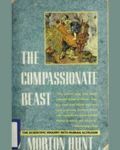
Hunt, Morton. The Compassionate Beast: What Science Is Discovering About the Humane Side of Humankind (William Morrow & Co, 1990)
Altruism--unselfish interest in the welfare of others--is one of man's most illusive and frequently disputed traits. In this work of revolutionary implication for parenting and social policy, Hunt moves beyond armchair philosophizing to look at recent research emerging on self-sacrificing for others.15,000 print.
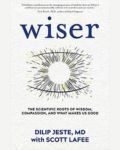
Jeste, Dilip MD. Wiser: The Scientific Roots of Wisdom, Compassion, and What Makes Us Good (Sounds True, 2020)
From the field's pioneer, an exploration of the neurobiology and psychology of wisdom: what science says it is and how to nurture it within yourself―at any stage of your life.
What exactly does it mean to be "wise?" And is it possible to grow and even accelerate its unfolding?
For over two decades, Dr. Dilip Jeste has led the search for the biological and cognitive roots of wisdom. What's emerged from his work is that wisdom is a very real and deeply multilayered set of traits.
Across many cultures and centuries, he's found that wise people are compassionate and empathetic, aware of their gifts and blind spots, open-minded, resolute and calm amid uncertainty, altruistic decision-makers who learn from their experiences, able to see from many perspectives and "altitudes," and often blessed with a sense of adventure and humor.
"The modern rise in suicides, opioid abuse, loneliness, and internet addiction is damaging people’s health and destroying the social fabric," Dr. Jeste reflects. But we all have the ability to nurture and grow every facet of wisdom to face these challenges and others more effectively.
If you seek to be a wiser person―with your family, at work, and in your community―this book will show you how, with the researcher who's launched and advanced this exciting new path to our highest human potential.
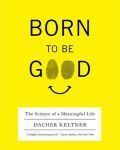
Keltner, Dacher. Born to be Good: The Science of a Meaningful Life (W. W. Norton & Company, 2009)
A landmark book in the science of emotions and its implications for ethics and human universals.
~ Library Journal, starred review
In this startling study of human emotion, Dacher Keltner investigates an unanswered question of human evolution: If humans are hardwired to lead lives that are “nasty, brutish, and short,” why have we evolved with positive emotions like gratitude, amusement, awe, and compassion that promote ethical action and cooperative societies? Illustrated with more than fifty photographs of human emotions, Born to Be Good takes us on a journey through scientific discovery, personal narrative, and Eastern philosophy. Positive emotions, Keltner finds, lie at the core of human nature and shape our everyday behavior―and they just may be the key to understanding how we can live our lives better.
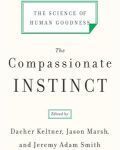
Keltner, Dacher and Jason Marsh. The Compassionate Instinct: The Science of Human Goodness (W. W. Norton & Company, 2010)
Leading scientists and science writers reflect on the life-changing, perspective-changing, new science of human goodness. In these pages you will hear from Steven Pinker, who asks, “Why is there peace?”; Robert Sapolsky, who examines violence among primates; Paul Ekman, who talks with the Dalai Lama about global compassion; Daniel Goleman, who proposes “constructive anger”; and many others. Led by renowned psychologist Dacher Keltner, the Greater Good Science Center, based at the University of California in Berkeley, has been at the forefront of the positive psychology movement, making discoveries about how and why people do good. Four times a year the center publishes its findings with essays on forgiveness, moral inspiration, and everyday ethics in Greater Good magazine. The best of these writings are collected here for the first time.
A collection of personal stories and empirical research, The Compassionate Instinct will make you think not only about what it means to be happy and fulfilled but also about what it means to lead an ethical and compassionate life.
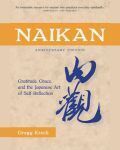
Krech, Gregg. Naikan: Gratitude, Grace and the Japanese Art of Self-Reflection (Stone Bridge Press, 2001)
Drawing on Eastern tradition, Naikan ("nye-kahn") is a structured method for intensely meditating on our lives, our interconnections, our missteps. Through Naikan we develop a natural and profound sense of gratitude for blessings bestowed on us by others, blessings that were always there but went unnoticed. This collection of introductory essays, parables, and inspirations explains what Naikan is and how it can be applied to life and celebrations throughout the year.
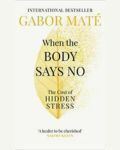
Mate, Gabor. When the Body Says No: The Cost of Hidden Stress (Vermilion, 2019)
An international bestseller translated into fifteen languages, When the Body Says No promotes learning and healing, providing transformative insights into how disease can be the body’s way of saying no to what the mind cannot or will not acknowledge.
Can a person literally die of loneliness? Is there a connection between the ability to express emotions and Alzheimer’s disease? Is there such a thing as a “cancer personality”?
Drawing on scientific research and the author’s decades of experience as a practicing physician, When the Body Says No: The Cost of Hidden Stress — published in the U.S. with the subtitle Exploring the Stress-Disease Connection, and also available in audiobook format — provides answers to these and other important questions about the effect of the mind-body link on illness and health and the role that stress and one’s individual emotional makeup play in an array of common diseases.
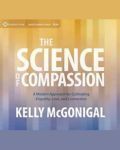
McConigal, Kelly. The Science of Compassion: A Modern Approach for Cultivating Empathy, Love, and Connection (Sounds True, 2016)
Breakthrough Science and Practical Tools for Cultivating Compassion
Why is compassion so powerful? Like many forms of spirituality and meditation, compassion practice has been shown by research to enhance your health, psychological well-being, relationships, and sense of purpose. "The unique quality of compassion," teaches Dr. Kelly McGonigal, "is that its benefits extend to the one who offers it, the one who receives it, and all those who witness compassion in action." With The Science of Compassion, this acclaimed researcher presents a practical workshop to help you understand what makes compassion work―and how you can cultivate it in your life.
The Power of Choosing Compassion
Compassion can be a difficult choice to make―after all, why would we deliberately choose to add another person’s pain to our own? "Not only does our compassion ease the suffering of others," teaches Dr. McGonigal, "Our brain, heart, and entire physiology are tuned to support us when we make the courageous decision to be compassionate." In this seven-hour training intensive, she provides invaluable tools and guidance for overcoming emotional fatigue, empathic distress, self-judgment, and other obstacles that can keep us closed down and afraid to reach out.
"Compassion is an embodied state that prepares us to take positive action," says Dr. McGonigal. Here is an audio course filled with cutting-edge science, inspirational stories, and research-based practices to help you build your capacity for generosity, empathy, and kindness―and become a compassionate force in the world.
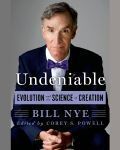
Nye, Bill. Undeniable: Evolution and the Science of Creation (St. Martin's Press, 2014)
"Evolution is one of the most powerful and important ideas ever developed in the history of science. Every question it raises leads to new answers, new discoveries, and new smarter questions. The science of evolution is as expansive as nature itself. It is also the most meaningful creation story that humans have ever found."
~ Bill Nye
Sparked by a controversial debate in February 2014, Bill Nye has set off on an energetic campaign to spread awareness of evolution and the powerful way it shapes our lives. In his New York Times bestseller, Undeniable: Evolution and the Science of Creation, he explains why race does not really exist; evaluates the true promise and peril of genetically modified food; reveals how new species are born, in a dog kennel and in a London subway; takes a stroll through 4.5 billion years of time; and explores the new search for alien life, including aliens right here on Earth.
With infectious enthusiasm, Bill Nye shows that evolution is much more than a rebuttal to creationism; it is an essential way to understand how nature works-and to change the world. It might also help you get a date on a Saturday night.
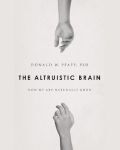
Pfaff, Donald. The Altruistic Brain: How We Are Naturally Good (Oxford University Press, 2015)
Since the beginning of recorded history, law and religion have provided "rules" that define good behavior. When we obey such rules, we assign to some external authority the capacity to determine how we should act. Even anarchists recognize the existence of a choice as to whether or not to obey, since no one has seriously doubted that the source of social order resides in our vast ethical systems. Debate has focused only on whose system is best, never for an instant imagining that law, religion, or some philosophical permutation of either was not the basis of prosocial action. The only divergence from this uniform understanding of human society has come from the behavioral sciences, which cite various biological bases for human goodness. Putting aside both ancient and relatively modern ethical systems, neuroscientists, psychologists, and evolutionary biologists have started a revolution more profound than any anarchist ever dreamed of. In essence, these researchers argue that the source of good human behavior - of the benevolence that we associate with the highest religious teachings - emanates from our physical make-up. Our brains, hormones, and genes literally embody our social compasses.
In The Altruistic Brain, renowned neuroscientist Donald Pfaff provides the latest, most far-reaching argument in support of this revolution, explaining in exquisite detail how our neuroanatomical structure favors kindness towards others.
Unlike any other study in its field, The Altruistic Brain synthesizes all the most important research into how and why - at a purely physical level - humans empathize with one another and respond altruistically. It demonstrates that human beings are "wired" to behave altruistically in the first instance, such that unprompted, spontaneous kindness is our default behavior; such behavior comes naturally, irrespective of religious or cultural determinants. Based on his own research and that of some of the world's most eminent scientists, Dr. Pfaff puts together well-established brain mechanisms into a theory that is at once novel but also easily demonstrable. He further explains how, using psycho-social approaches that are now well understood, we can clear away obstacles to the brain's natural, altruistic inclinations. This is the first book not only to explain why we are naturally good, but to suggest means of making us behave as well as we can.
The Altruistic Brain is required reading for anyone who wants to understand the behavioral revolution in science and the promise that it holds for reorienting society towards greater cooperation.
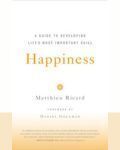
Ricard, Matthieu. Happiness: A Guide to Developing Life's Most Important Skill (Little, Brown and Company, 2008)
French scientist-turned-Buddhist-monk Matthieu Ricard is one of our greatest intellectual heroes. The son of prominent French philosopher and intellectual Jean-François Revel, Ricard got a degree in molecular genetics, then decided to step away from his career in science and devote his life to the study of Buddhism. His inner scientist, however, remained wide awake as he developed a keen interest in the neurological effects of meditation and mindfulness training.
In Happiness: A Guide to Developing Life’s Most Important Skill, he distills 25 centuries of Buddhist spiritual tradition alongside bleeding-edge neuroscience and the most compelling findings of Western cognitive psychology — an intelligent and refreshing vision for fusing the life of the mind and the life of the heart into a path of genuine psychoemotional fulfillment.
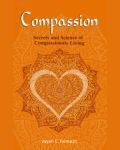
Romesh, Jayan. Compassion: Secrets and Science of Compassionate Living (Independently Published, 2020)
Written with compassion and keen insight, “C-O-M-P-A-S-S-I-O-N” opens the boundless heart, helping everyone understand compassion as a revolutionary practice. It shows that compassion for all sentient beings is naturally present within our hearts. In this life transforming book, Jayan E. Romesh combines the wisdom of his own compassion, and the depth of his understanding to illuminate these many facets of compassion. Even when compassion from others may seems out of reach, we can learn how to let it come to the surface and embrace the world around us.
This revolutionary book is a precious guide to help you experience one of the most supreme of emotions with: Ancient Secrets of Compassion, Meditations and Reflections, Mindfulness Based Compassionate Practices, Science of Compassion – Mirror Neurons, Neuroplasticity and more, Cultivating Compassionate Qualities, A Path to Recovering from Addiction, and Insights for a New Planet.
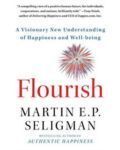
Seligman, Martin, E.P. Flourish: A Visionary New Understanding of Happiness and Well-Being (Atria Books, 2012)
With this unprecedented promise, internationally esteemed psychologist Martin Seligman begins Flourish, his first book in ten years—and the first to present his dynamic new concept of what well-being really is. Traditionally, the goal of psychology has been to relieve human suffering, but the goal of the Positive Psychology movement, which Dr. Seligman has led for fifteen years, is different—it’s about actually raising the bar for the human condition.
Flourish builds on Dr. Seligman’s game-changing work on optimism, motivation, and character to show how to get the most out of life, unveiling an electrifying new theory of what makes a good life—for individuals, for communities, and for nations. In a fascinating evolution of thought and practice, Flourish refines what Positive Psychology is all about.
While certainly a part of well-being, happiness alone doesn’t give life meaning. Seligman now asks, What is it that enables you to cultivate your talents, to build deep, lasting relationships with others, to feel pleasure, and to contribute meaningfully to the world? In a word, what is it that allows you to flourish? “Well-being” takes the stage front and center, and Happiness (or Positive Emotion) becomes one of the five pillars of Positive Psychology, along with Engagement, Relationships, Meaning, and Accomplishment—or PERMA, the permanent building blocks for a life of profound fulfillment.
Thought-provoking in its implications for education, economics, therapy, medicine, and public policy—the very fabric of society—Flourish tells inspiring stories of Positive Psychology in action, including how the entire U.S. Army is now trained in emotional resilience; how innovative schools can educate for fulfillment in life and not just for workplace success; and how corporations can improve performance at the same time as they raise employee well-being.
With interactive exercises to help readers explore their own attitudes and aims, Flourish is a watershed in the understanding of happiness as well as a tool for getting the most out of life. On the cutting edge of a science that has changed millions of lives, Dr. Seligman now creates the ultimate extension and capstone of his bestselling classics, Authentic Happiness and Learned Optimism.
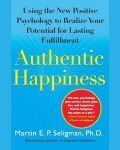
Seligman, Martin. Authentic Happiness: Using the New Positive Psychology to Realize Your Potential for Lasting Fulfillment
Back in the day, we had the pleasure of studying under Dr. Martin Seligman, father of the thriving positive psychology movement — a potent antidote to the traditional “disease model” of psychology, which focuses on how to relieve suffering rather than how to amplify well-being. Authentic Happiness: Using the New Positive Psychology to Realize Your Potential for Lasting Fulfillment offers a toolkit for harnessing our core strengths to make everyday interactions more fulfilling, complete with a range of assessment tools and self-tests rooted in cognitive science and behavioral psychology research.
Relieving the states that make life miserable… has made building the states that make life worth living less of a priority. The time has finally arrived for a science that seeks to understand positive emotion, build strength and virtue, and provide guideposts for finding what Aristotle called the ‘good life.’
~ Martin Seligman
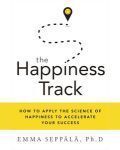
Seppala, Emma. The Happiness Track: How to Apply the Science of Happiness to Accelerate Your Success (HarperOne, 2017)
In The Happiness Track, founder of Fulfillment Daily and science director of the Center for Compassion and Altruism Research and Education at Stanford University Emma Seppälä draws upon the latest scientific research on resilience, willpower, compassion, positive stress, creativity, and mindfulness to reveal the connection between happiness and success, and how to achieve both. Featuring practical strategies we can use in our daily lives, The Happiness Track will show you the fulfilling, rewarding, and anxiety-free life that is within your reach.
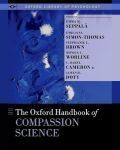
Seppala, Emma, Emiliana Simon-Thomas, Stephanie L. Brown, C. Darly Cameron, Monica C. Worline and James R. Doty. The Oxford Handbook of Compassion Science (Oxford Library of Psychology, 2017)
How do we define compassion? Is it an emotional state, a motivation, a dispositional trait, or a cultivated attitude? How does it compare to altruism and empathy? Chapters in this Handbook present critical scientific evidence about compassion in numerous conceptions. All of these approaches to thinking about compassion are valid and contribute importantly to understanding how we respond to others who are suffering.
Covering multiple levels of our lives and self-concept, from the individual, to the group, to the organization and culture, The Oxford Handbook of Compassion Science gathers evidence and models of compassion that treat the subject of compassion science with careful scientific scrutiny and concern. It explores the motivators of compassion, the effect on physiology, the co-occurrence of well-being, and compassion training interventions. Sectioned by thematic approaches, it pulls together basic and clinical research ranging across neurobiological, developmental, evolutionary, social, clinical, and applied areas in psychology such as business and education. In this sense, it comprises one of the first multidisciplinary and systematic approaches to examining compassion from multiple perspectives and frames of reference.
With contributions from well-established scholars as well as young rising stars in the field, this Handbook bridges a wide variety of diverse perspectives, research methodologies, and theory, and provides a foundation for this new and rapidly growing field. It should be of great value to the new generation of basic and applied researchers examining compassion, and serve as a catalyst for academic researchers and students to support and develop the modern world.
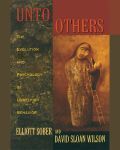
Sober, Elliott and David Sloan Wilson. Unto Others: The Evolution and Psychology of Unselfish Behavior (Harvard University Press, 1999)
No matter what we do, however kind or generous our deeds may seem, a hidden motive of selfishness lurks--or so science has claimed for years. This book, whose publication promises to be a major scientific event, tells us differently. In Unto Others philosopher Elliott Sober and biologist David Sloan Wilson demonstrate once and for all that unselfish behavior is in fact an important feature of both biological and human nature. Their book provides a panoramic view of altruism throughout the animal kingdom--from self-sacrificing parasites to insects that subsume themselves in the superorganism of a colony to the human capacity for selflessness--even as it explains the evolutionary sense of such behavior.
Explaining how altruistic behavior can evolve by natural selection, this book finally gives credence to the idea of group selection that was originally proposed by Darwin but denounced as heretical in the 1960s. With their account of this controversy, Sober and Wilson offer a detailed case study of scientific change as well as an indisputable argument for group selection as a legitimate theory in evolutionary biology.
Unto Others also takes a novel evolutionary approach in explaining the ultimate psychological motives behind unselfish human behavior. Developing a theory of the proximate mechanisms that most likely evolved to motivate adaptive helping behavior, Sober and Wilson show how people and perhaps other species evolved the capacity to care for others as a goal in itself.
A truly interdisciplinary work that blends biology, philosophy, psychology, and anthropology, this book will permanently change not just our view of selfless behavior but also our understanding of many issues in evolutionary biology and the social sciences.
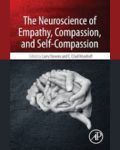
Stevens, Larry and Chad C. Woodruff. The Neuroscience of Empathy, Compassion and Self-Compassion (Academic Press, 2018)
The Neuroscience of Empathy, Compassion, and Self-Compassion provides contemporary perspectives on the three related domains of empathy, compassion and self-compassion (ECS). It informs current research, stimulates further research endeavors, and encourages continued and creative philosophical and scientific inquiry into the critical societal constructs of ECS. Examining the growing number of electrocortical (EEG Power Spectral, Coherence, Evoked Potential, etc.) studies and the sizeable body of exciting neuroendocrine research (e.g., oxytocin, dopamine, etc.) that have accumulated over decades, this reference is a unique and comprehensive approach to empathy, compassion and self-compassion.
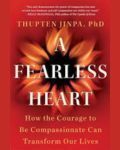
Thupten, Jinpa. A Fearless Heart: How the Courage to Be Compassionate Can Transform Our Lives (Avery, 2016)
The highly acclaimed thought leader and English translator of the Dalai Lama shows us how compassion works as a powerful inner resource that can yield surprising and compelling benefits—not just for others, but for ourselves.
The Buddhist practice of mindfulness first caught on in the West when we began to understand its many practical benefits. Now Thupten Jinpa, Ph.D., introduces a practice with even greater life-changing power: compassion. Based on the revolutionary course in Compassion Cultivation Training at Stanford that Jinpa helped to create, A Fearless Heart shows us that compassion can be a path through suffering, a key to robust health, and even an effective way to reach our goals.
Yet we fear compassion. We worry that if we are too compassionate with others, they will take advantage of us, and too much self-compassion will make us slackers. Pulling from the latest Western research as well as traditional Buddhist psychology, Jinpa offers simple daily practices that will help readers train their compassion muscle for a greater meaning, connection, and fulfillment.
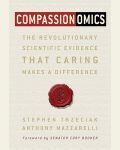
Trzeciak, Stephen and Anthony Mazzarelli. Compassionomics: The Revolutionary Scientific Evidence That Caring Makes a Difference (Studer, 2019)
A 34-year-old man fighting for his life in the Intensive Care Unit is on an artificial respirator for over a month. Could it be that his chance of getting off the respirator is not how much his nurses know, but rather how much they care?
A 75-year-old woman is heroically saved by a major trauma center only to be discharged and fatally struck by a car while walking home from the hospital. Could a lack of compassion from the hospital staff have been a factor in her death?
Compelling new research shows that health care is in the midst of a compassion crisis. But the pivotal question is this: Does compassion really matter? In Compassionomics: The Revolutionary Scientific Evidence that Caring Makes a Difference, physician scientists Stephen Trzeciak and Anthony Mazzarelli uncover the eye-opening data that compassion could be a wonder drug for the 21st century.
Now, for the first time ever, a rigorous review of the science - coupled with captivating stories from the front lines of medicine - demonstrates that human connection in health care matters in astonishing ways. Never before has all the evidence been synthesized together in one place.
You will see compelling evidence that:
- Compassion has vast benefits for patients across a wide variety of conditions
- Missed opportunities for compassion can have devastating health effects
- Compassion can help reverse the cost crisis in health care
- Compassion can be an antidote for burnout among health care providers
- 40 seconds of compassion can save a life
After seeing all the evidence, the answer is crystal clear: Compassion matters...in not only meaningful but measurable ways.
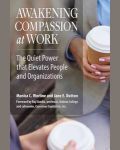
Worline, Monica C. and Jane E. Dutton. Awakening Compassion at Work: The Quiet Power that Elevates People and Organizations (Berrett-Koehler Publishers, 2017)
Suffering in the workplace can rob our colleagues and coworkers of humanity, dignity, and motivation and is an unrecognized and costly drain on organizational potential. Marshaling evidence from two decades of field research, scholars and consultants Monica Worline and Jane Dutton show that alleviating such suffering confers measurable competitive advantages in areas like innovation, collaboration, service quality, and talent attraction and retention. They outline four steps for meeting suffering with compassion and show how to build a capacity for compassion into the structures and practices of an organization—because ultimately, as they write, “Compassion is an irreplaceable dimension of excellence for any organization that wants to make the most of its human capabilities.”


